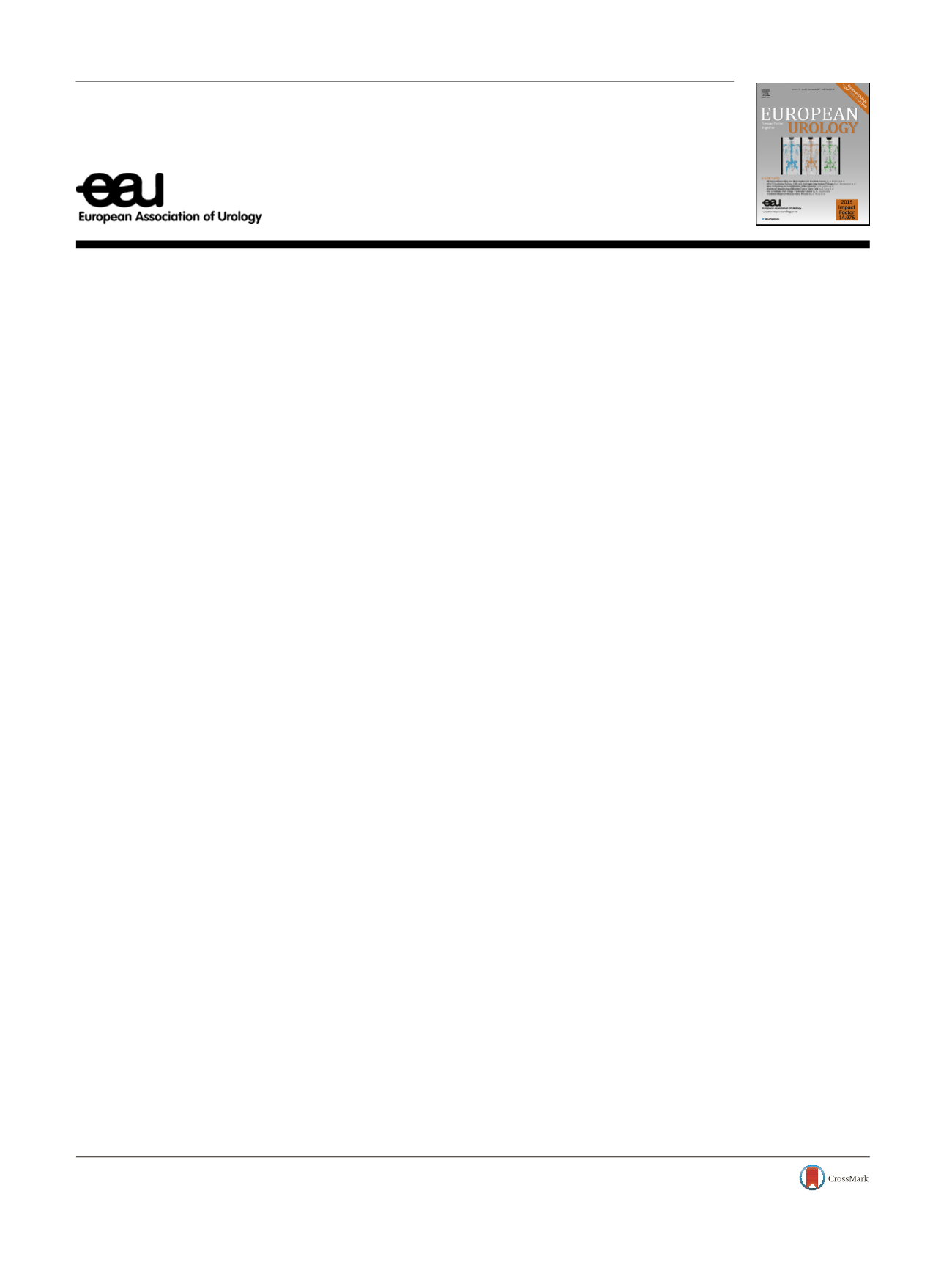

Letter to the Editor
Re: Pascal Rischmann, Albert Gelet, Benjamin Riche,
et al. Focal High Intensity Focused Ultrasound of
Unilateral Localized Prostate cancer: A Prospective
Multicentric Hemiablation Study of 111 Patients.
Eur Urol 2017;71:267–73
I read with interest
[6_TD$DIFF]
this
[7_TD$DIFF]
thought-provoking article by
Rischmann et al
[1]
on a novel therapeutic approach in
patients with unilateral localized prostate cancer.
According to the article, the French Urological Associa-
tion initiated a stage 2b early dispersion and exploration
prospective IDEAL multi-institutional study (2009–2015) to
evaluate high-intensity focused ultrasound (HIFU) hemi-
ablation as a primary treatment in treatment-naı¨ve patients
with cT1/T2 unilateral ( 2 adjacent sextants) and Gleason
score 7 (3 + 4) prostate cancer.
The idea behind this
[8_TD$DIFF]
remarkable and well-conducted
study is that focal therapy could be used in the management
of selected prostate cancer patients
[2]
to achieve good
long-term control of the disease, minimal morbidity, and a
minimal risk of subsequent radical therapy, because
approximately 20% of candidates for radical prostatectomy
have unilateral cancers and could be treated ‘‘minimally’’
with a hemiablation procedure
[3]
.
In this study, transurethral resection of the prostate
(TURP) was performed (either
>
2 mo before HIFU or
combined with the HIFU procedure) to either reduce the
prostate volume (for prostate
>
50 cm
3
[1_TD$DIFF]
) or to alleviate
symptoms of a urinary obstruction known before treat-
ment. Finally, TURP was performed before treatment in
26 patients with a mean prostate volume of 69.9 cm
3
(standard deviation 23.3) and in 41 patients concomitant
with the HIFU hemiablation.
There are no data reported on the histology of the TURP
specimens obtained from these 67 patients. To my mind,
this information is very important. If these specimens were
positive for prostate cancer, then it is possible that the TURP
could have a debulking or cytoreductive effect, which could
be a confounding variable in the study, leading to erroneous
interpretation of the findings. Are we looking at the results
of the HIFU hemiablation alone or of a combined approach,
involving application of HIFU hemiablation in combination
with TURP?
It would be useful to mention whether this parameter
was taken into consideration in the statistical analysis and
interpretation of the final results, because 67/111 (60.4%) of
the patients enrolled underwent TURP. I believe that
detailed TURP histology results could help in elucidating
this issue.
Conflicts of interest:
The author has nothing to disclose.
References
[1]
Rischmann P, Gelet A, Riche B, et al. Focal high intensity focused ultrasound of unilateral localized prostate cancer: a prospective multicentric hemiablation study of 111 patients. Eur Urol 2017;71:267–73.[2]
Onik G, Narayan P, Vaughan D, Dineen M, Brunelle R. Focal ‘‘nerve- sparing’’ cryosurgery for treatment of primary prostate cancer: a new approach to preserving potency. Urology 2002;60:109–14.[3]
Mouraviev V, Mayes JM, Sun L, et al. Prostate cancer laterality as a rationale of focal ablative therapy for the treatment of clinically localized prostate cancer. Cancer 2007;110:906–10.Lampros Mitrakas*
Klinik fu¨r Urologie und Kinderurologie, Sozialstiftung Bamberg, Klinikum am
Bruderwald, Bamberg, Germany
*Klinik fu¨ r Urologie und Kinderurologie, Sozialstiftung Bamberg,
Klinikum am Bruderwald, Buger
[2_TD$DIFF]
Straße
[3_TD$DIFF]
80,
[4_TD$DIFF]
96049 Bamberg, Germany.
Tel. +49
[5_TD$DIFF]
95150312030.
E-mail address:
lamprosmit@gmail.com .April 28, 2017
E U R O P E A N U R O L O G Y 7 2 ( 2 0 1 7 ) e 1 2 6available at
www.scienced irect.comjournal homepage:
www.europeanurology.comDOI of original article:
http://dx.doi.org/10.1016/j.eururo.2016.09.039.
http://dx.doi.org/10.1016/j.eururo.2017.04.0350302-2838/
#
2017 European Association of Urology. Published by Elsevier B.V. All rights reserved.
















